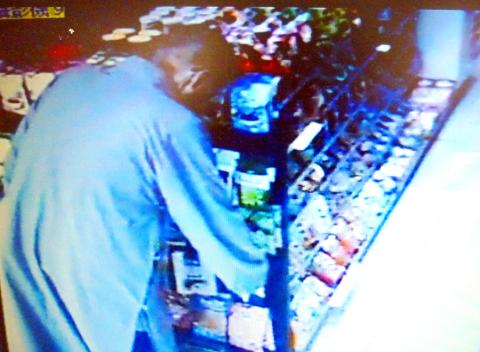A Buddhist monk in Nantou County apologized for disregarding the Buddhist tradition of strict adherence to vegetarianism when he was reportedly caught shoplifting packets of beef jerky at a convenience store last week.
After his arrest on shoplifting charges, the 60-year-old reportedly said: “It was the covetous desire inside me, I am very sorry, I have let Lord Buddha down.”
“I don’t know why, but lately I had this craving for meat,” he reportedly said when questioned by police.

Photo copied by Hsieh Chieh-yu, Taipei Times
In Taiwanese Buddhism, monks and nuns must strictly avoid killing creatures and eating meat. They must also remain celibate and refrain from consuming alcohol or other intoxicants.
According to a police statement, the suspect had visited several monasteries around Taiwan, and in recent months, he took up residence at a Zen Buddhist temple in Nantou.
The police expressed surprise at discovering that the shoplifting suspect had been educated abroad, obtained a master’s degree at a US university and also holds the position of “master” in Buddhist temples.
In total, he is said to have shop-lifted spiced beef jerky three times from a convenience store near the temple.
The store alleged last month that the monk had taken beef jerky that sells at NT$60 a packet. The monk, wearing his cassock, reportedly returned a week later.
A store employee said that when they took the inventory that night, they found that spiced beef jerky packets were missing.
A scan of the in-store surveillance camera footage showed the monk took the beef jerky and ate it while seated inside the store, store representatives said.
Last week, the monk visited again and the store surveillance camera reportedly caught him pocketing the same brand of spiced beef jerky.
Before he walked out, the local police were called.
The monk at first denied having done anything wrong, saying: “I came to the store to buy things, why should I be searched?”
After the store produced the videotape evidence, police said the monk became “flustered” and tried to explain, saying: “I was careless and forgot to pay. I would like to make reparations and pay the store.”
The police said they arrested the monk on a charge of theft.
A spokesperson for the Religion Trade Union of Nantou County said the case should be a lesson for all monks, as the requirement of abstinence from eating meat had been violated and that stealing things is an indictable crime.
He said the first Buddhist precept is “no killing,” requiring monks and nuns to practice vegetarianism to reduce the suffering of living creatures.

CHANGING LANDSCAPE: Many of the part-time programs for educators were no longer needed, as many teachers obtain a graduate degree before joining the workforce, experts said Taiwanese universities this year canceled 86 programs, Ministry of Education data showed, with educators attributing the closures to the nation’s low birthrate as well as shifting trends. Fifty-three of the shuttered programs were part-time postgraduate degree programs, about 62 percent of the total, the most in the past five years, the data showed. National Taiwan Normal University (NTNU) discontinued the most part-time master’s programs, at 16: chemistry, life science, earth science, physics, fine arts, music, special education, health promotion and health education, educational psychology and counseling, education, design, Chinese as a second language, library and information sciences, mechatronics engineering, history, physical education

DEADLOCK: As the commission is unable to forum a quorum to review license renewal applications, the channel operators are not at fault and can air past their license date The National Communications Commission (NCC) yesterday said that the Public Television Service (PTS) and 36 other television and radio broadcasters could continue airing, despite the commission’s inability to meet a quorum to review their license renewal applications. The licenses of PTS and the other channels are set to expire between this month and June. The National Communications Commission Organization Act (國家通訊傳播委員會組織法) stipulates that the commission must meet the mandated quorum of four to hold a valid meeting. The seven-member commission currently has only three commissioners. “We have informed the channel operators of the progress we have made in reviewing their license renewal applications, and

The High Prosecutors’ Office yesterday withdrew an appeal against the acquittal of a former bank manager 22 years after his death, marking Taiwan’s first instance of prosecutors rendering posthumous justice to a wrongfully convicted defendant. Chu Ching-en (諸慶恩) — formerly a manager at the Taipei branch of BNP Paribas — was in 1999 accused by Weng Mao-chung (翁茂鍾), then-president of Chia Her Industrial Co, of forging a request for a fixed deposit of US$10 million by I-Hwa Industrial Co, a subsidiary of Chia Her, which was used as collateral. Chu was ruled not guilty in the first trial, but was found guilty

Taiwan People’s Party (TPP) Chairman Huang Kuo-chang (黃國昌) yesterday appealed to the authorities to release former Taipei mayor Ko Wen-je (柯文哲) from pretrial detention amid conflicting reports about his health. The TPP at a news conference on Thursday said that Ko should be released to a hospital for treatment, adding that he has blood in his urine and had spells of pain and nausea followed by vomiting over the past three months. Hsieh Yen-yau (謝炎堯), a retired professor of internal medicine and Ko’s former teacher, said that Ko’s symptoms aligned with gallstones, kidney inflammation and potentially dangerous heart conditions. Ko, charged with